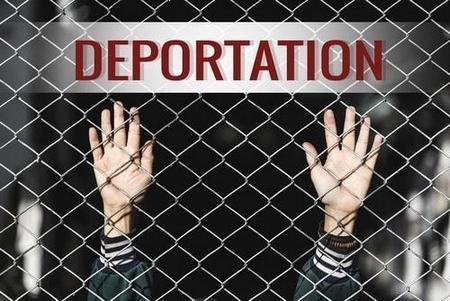Recent Blog Posts
Cancellation of Removal for a Lawful Permanent Resident
 Even lawful permanent residents (LPR) of the US, or green card holders, can be deported. If you receive a Notice to Appear before an immigration judge, then removal proceedings have begun against you. You will need to hire your own immigration attorney to represent you in these proceedings. To prevent your deportation, your attorney may file a petition for cancellation of removal, which the immigration judge may or may not approve, depending on the strength of the arguments made by your attorney.
Even lawful permanent residents (LPR) of the US, or green card holders, can be deported. If you receive a Notice to Appear before an immigration judge, then removal proceedings have begun against you. You will need to hire your own immigration attorney to represent you in these proceedings. To prevent your deportation, your attorney may file a petition for cancellation of removal, which the immigration judge may or may not approve, depending on the strength of the arguments made by your attorney.
Deportable Offenses: Grounds for Removal of an LPR
Removal proceedings may be initiated against a lawful permanent resident for any of the following deportable offenses:
- Commission of immigration fraud.
- Participation in terrorist activities.
- False claim of citizenship or unlawful voting in an election restricted to citizens.
- Conviction of a felony crime of moral turpitude within 5 years of entering the U.S. for which a sentence of one year or longer may be imposed.
Things You Should Know Before Pursuing an Illinois Dog Bite Injury Claim
 Tens of thousands of years ago, dogs began becoming domesticated creatures and their DNA changed from that of their wolf ancestors. Today, dogs are the most popular species of pet for Americans -- around 68 percent of American households own at least one dog. According to the American Veterinary Medical Association, more than 4.5 million people are bitten by dogs each year and at least half of those people are young children. Dog bites can result in serious injuries and in some cases, even serious, life-threatening infections. Dog bites can also cause emotional distress, especially in children. Pursuing a dog bite injury claim can be tedious, which is why there are a few things you should know before you begin the process.
Tens of thousands of years ago, dogs began becoming domesticated creatures and their DNA changed from that of their wolf ancestors. Today, dogs are the most popular species of pet for Americans -- around 68 percent of American households own at least one dog. According to the American Veterinary Medical Association, more than 4.5 million people are bitten by dogs each year and at least half of those people are young children. Dog bites can result in serious injuries and in some cases, even serious, life-threatening infections. Dog bites can also cause emotional distress, especially in children. Pursuing a dog bite injury claim can be tedious, which is why there are a few things you should know before you begin the process.
Illinois Has a Definition for “Dangerous Dogs” and “Vicious Dogs”
The Illinois Animal Control Act (510 ILCS 5/) contains the governing statutes for injuries sustained by animals, including dogs. According to 510 ILCS 5/2.05a, a “dangerous dog” is a dog that is unmuzzled, unleashed or unattended by its owner and behaves in a manner that would be reasonably construed as a serious and unjustified threat of physical injury or death. A dog that unjustly bites a person and does not cause serious physical injury can also be considered a “dangerous dog.” A “vicious dog” is one that unjustly attacks a person and causes serious physical injury or death, or a dog that has been found to be a “dangerous dog” three separate times.
Tips to Help You Deal with Your Insurance Company After Your Illinois Car Accident
 Getting into a car accident can be a very scary experience for most people. Often times, getting into a car accident can result in serious injuries that can lead to permanent damage if not treated correctly. When you are recovering from injuries from a car accident, the last thing you want to do is relentlessly fight with your insurance company to get a fair settlement. Dealing with any type of insurance company can be annoying — they often will try everything they can to give you the smallest settlement possible. Here are five tips that can help you deal with your car insurance company after an accident:
Getting into a car accident can be a very scary experience for most people. Often times, getting into a car accident can result in serious injuries that can lead to permanent damage if not treated correctly. When you are recovering from injuries from a car accident, the last thing you want to do is relentlessly fight with your insurance company to get a fair settlement. Dealing with any type of insurance company can be annoying — they often will try everything they can to give you the smallest settlement possible. Here are five tips that can help you deal with your car insurance company after an accident:
Make Sure You Are Prepared
Before you submit your claim or call the claims adjuster that your insurance company has assigned to you, you should make sure that you have everything that you will need to submit the claim. Check and make sure you have copies of things such as:
- Evidence that you collected at the scene of the accident, such as photos;
How Does the Collaborative Divorce Process Work?
 If you anticipate that your divorce will be both complicated and contentious — perhaps due to parenting style differences, children with special needs, or substantial income and assets to be divided — consider which of these two options sounds better:
If you anticipate that your divorce will be both complicated and contentious — perhaps due to parenting style differences, children with special needs, or substantial income and assets to be divided — consider which of these two options sounds better:
You and your spouse each choose an aggressive lawyer who will fight out your issues in one-to-one negotiation or in court, if necessary. Consider which of you has more money to spend and is more likely to drag out the legal process out of spite.
You and your spouse agree to resolve your divorce without going to court, working cooperatively with a team of professionals who will provide a neutral perspective and recommendations on both financial and parenting issues with a focus on the best interests of your family as a whole.
If the latter approach sounds better to you, then the collaborative divorce process might be right for you.
Work Permits for H1B Spouses to Be Discontinued
 In any given year, the U.S. grants approximately 85,000 H1B visas, given to foreign workers with special skills or highly specialized knowledge. For a long time, their spouses were denied permission to work in the U.S., but in 2014, employment authorization documents (EAD) were granted to H4 visa holders, which is the visa given to the spouses of H1B holders. Now, in 2019, the current administration has published a notice of intent to roll back the program granting the EADs, arguing that too much competition with U.S. workers is created.
In any given year, the U.S. grants approximately 85,000 H1B visas, given to foreign workers with special skills or highly specialized knowledge. For a long time, their spouses were denied permission to work in the U.S., but in 2014, employment authorization documents (EAD) were granted to H4 visa holders, which is the visa given to the spouses of H1B holders. Now, in 2019, the current administration has published a notice of intent to roll back the program granting the EADs, arguing that too much competition with U.S. workers is created.
Program in Limbo Since 2015
The Obama administration granted the right to seek an EAD to H4 holders in 2014, but in 2015, a group called SaveJobs, comprised of ‘displaced’ U.S. tech workers, sued the administration, alleging that it had overstepped its bounds and that granting EADs to this group of nonimmigrants would make it harder for U.S. citizens to find work in technology. The group lost, appealed, and the case was continued multiple times, allegedly while the rule was being rewritten and refined.
Liability in Illinois Car Accidents Involving Ridesharing Companies and Drivers
 Gone are the days of stepping off of the street curb in a desperate attempt to get one of the dozens of taxi cabs to notice your flailing arms. Now, you can simply pull out your smartphone and with a few taps, you can have a car outside waiting to take you to where ever you want to go within minutes. Ridesharing companies such as Uber and Lyft have taken off and are becoming more popular than ever. Those these companies offer convenience and simplicity, they pose rather complex and often ambiguous situations, particularly when one of these ridesharing vehicles gets into a car accident with a passenger inside.
Gone are the days of stepping off of the street curb in a desperate attempt to get one of the dozens of taxi cabs to notice your flailing arms. Now, you can simply pull out your smartphone and with a few taps, you can have a car outside waiting to take you to where ever you want to go within minutes. Ridesharing companies such as Uber and Lyft have taken off and are becoming more popular than ever. Those these companies offer convenience and simplicity, they pose rather complex and often ambiguous situations, particularly when one of these ridesharing vehicles gets into a car accident with a passenger inside.
What Is a Ridesharing Company?
The Illinois Transportation Network Providers Act is the section of law that outlines rules and regulations for transportation network companies (TNCs). The Act defines a TNC as any entity that operates by use of a digital network to connect passengers to TNC drivers who provide ride services. A TNC driver owns his or her own vehicle and is not associated with any taxicab service. Popular TNCs include Uber, Lyft, Sidecar and Via.
How to Win Court Approval to Relocate with Your Child

Divorced parents often try to stay in the same area in order to maximize both parents’ involvement in the lives of their children, but that is not always possible. One parent may have a career opportunity that requires relocation, or maybe they just want to move closer to their family. If the relocation distance is substantial, the other parent may object because it will affect parenting time with their children and add the burden of travel costs. These cases often must be argued in court.
What Distance Does Illinois Consider a Relocation?
Illinois law 750 ILCS 5/600(g) defines relocation in terms of the distance between the child’s current primary residence and the new address, as measured by an internet mapping service which provides a distance in miles driven.
If the child’s current primary residence is within the Chicago metro area of Cook, DuPage, Kane, Lake, McHenry, and Will Counties, a move of more than 25 miles is treated as a relocation.
What Is Immigration Parole?
 Sometimes, someone who has been waiting for a visa or another immigration status will want or need to travel abroad, but they may not have a passport or other valid status that will let them back in the United States upon return. Alternatively, sometimes someone in your family may need to be let into the U.S. quickly, especially in cases such as family emergencies. In both of these situations, the remedy is called parole - the latter is humanitarian parole, while the former is called advance parole. Both can be difficult - but not impossible - to get.
Sometimes, someone who has been waiting for a visa or another immigration status will want or need to travel abroad, but they may not have a passport or other valid status that will let them back in the United States upon return. Alternatively, sometimes someone in your family may need to be let into the U.S. quickly, especially in cases such as family emergencies. In both of these situations, the remedy is called parole - the latter is humanitarian parole, while the former is called advance parole. Both can be difficult - but not impossible - to get.
Advance Parole
Advance Parole (AP) is exclusively for those who are not in legal immigration status - for example, those who have been granted asylum or refugee status, those who are in the middle of adjusting status, and those who have been granted Temporary Protected Status (TPS). In some cases, it may be able to be granted for those who still have an asylum claim pending before the courts. AP allows someone who belongs to any of these groups, or a few select others, to be able to travel abroad and return to the country to continue waiting for their official immigration status to vest.
Tips to Keep You Safe on Illinois Roads in the Spring
 It is that time of year again -- spring has arrived. March and April can be odd months because it can be winter one day, snowing 6 inches overnight, and then the next day it will be 50 degrees and sunny. While this kind of weather is a nice preview of what is to come during the summer months, it can make for dangerous driving conditions. Months of winter snow cause potholes to form and the constant melting of ice during the day and freezing temperatures overnight make for slippery roads. Here are a few tips to help you keep yourself and your family safe while on the roads:
It is that time of year again -- spring has arrived. March and April can be odd months because it can be winter one day, snowing 6 inches overnight, and then the next day it will be 50 degrees and sunny. While this kind of weather is a nice preview of what is to come during the summer months, it can make for dangerous driving conditions. Months of winter snow cause potholes to form and the constant melting of ice during the day and freezing temperatures overnight make for slippery roads. Here are a few tips to help you keep yourself and your family safe while on the roads:
Watch Out for Potholes
Roads take a beating throughout the winter. With snow, ice, salt and then water, it is no wonder that roads are riddled with potholes come spring. During this time of year, construction crews probably have not gotten a chance to fix these potholes yet, which means you need to be very aware of them. Not only can driving over one cause damage to your vehicle, swerving to miss a pothole can cause accidents with other drivers.
What Is a Notice to Appear?
 When removal proceedings are instituted against you, you will receive what is called a Notice to Appear (NTA) in the mail. An NTA essentially informs you officially that you have been placed in immigration removal proceedings, and that you must appear in front of an immigration judge at a date in the future to plead your case. This can be a worrisome situation, especially if you do not understand the nature of the proceedings or if there are other confusing details.
When removal proceedings are instituted against you, you will receive what is called a Notice to Appear (NTA) in the mail. An NTA essentially informs you officially that you have been placed in immigration removal proceedings, and that you must appear in front of an immigration judge at a date in the future to plead your case. This can be a worrisome situation, especially if you do not understand the nature of the proceedings or if there are other confusing details.
NTA Grants Time to Prepare
One important thing you should be aware of is that by law, you are entitled to at least ten days between your receipt of the NTA and your master calendar hearing, which is the hearing at which you go before the immigration judge and articulate whether or not you intend to fight removal. (Given the immigration court backlog as of this writing, your master calendar hearing may be very much delayed beyond 10 days.) In the time between receipt of the NTA and your master calendar, it is a good idea to verify that all the information on the NTA is correct, and to take steps to fix it if there is an error.
 English,
English,
 Spanish,
Spanish,
 Polish,
Polish,
 Urdu
Urdu












 Make a Payment
Make a Payment



